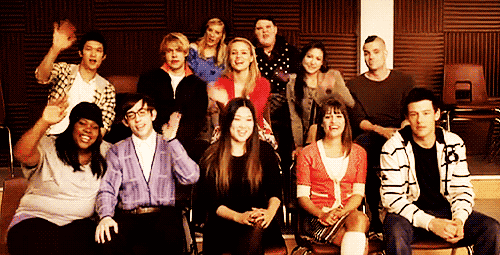Warning: this post contains spoilers.
In the first part of an interview published on Tuesday, Ryan Murphy, a creator and executive producer of “Glee,” talked about why he chose to take on the subject of gay bullying in Tuesday night’s episode, called “Never Been Kissed.” In this second installment, Mr. Murphy answers questions raised by the episode, in which Kurt (Chris Colfer) meets Blaine (Darren Criss), a gay student in a rival singing group, and stands up to a bully who persecutes him for being gay, while his fellow glee-choir members learn they’ve been tormenting Coach Bieste (Dot Jones) without realizing it. (One last warning that if you haven’t watched the episode yet, this interview will give away plot details.)
In this episode we were introduced to Blaine, who becomes a kind of role model to Kurt. Aren’t you giving yourself and the story an easy way out there? Doesn’t this avoid the subject of gay teens who feel alone because they don’t know anyone else who is gay?
I think that that character is fascinating, because he is incredibly strong and, based on the [music] we’ve released, that “Teenage Dream” song has gotten hundreds of thousands of hits. People really seem to be taken by that character and they don’t even know him yet.
But I also think that he’s tormented because, as he says to Kurt in the storyline, “I ran.” I put my tail between my legs and I left my situation and I regret it. I don’t think he’s some big white knight who walks in and does the “We’re here, we’re queer, get used to it,” thing. He has great self-loathing and wishes he would have handled himself differently, and those things will play out over the course of the season – trying to rectify what he perceives as weakness and wrongdoing on his own part. I didn’t write some sort of heroic, Clark Kent-like character.
We also learned that Kurt’s bully has been antagonizing him because he is conflicted with his own sexuality. That certainly happens in real life, but again, doesn’t it avoid the issue of people who are simply bigoted or intolerant?
The turn that character takes is based on someone in my life that I know who did that. Somebody who regularly and routinely beat up other gay kids and called them [slurs] and hit them, and the truth of the matter is, he came out of the closet in his 20s and had to get himself to a psychiatrist to deal with the hell he put so many people through because of his own issues. I will say that’s not the only bully or homophobic character that will arise from that storyline this season. I don’t think you can just present the person picking on somebody else because of their own secret, sad agenda. There are just people who hate gay people and pick on them because of their prejudice and hatred, and those characters need to be explored as well. I think we have done that on the show and we will continue to do that.
Did you specifically include the subplot about Coach Bieste, who is teased behind her back by the male singers in the glee choir, to show that bullying doesn’t have to be overt to damage someone?
Yeah, we really wanted to do an episode about it, but not obviously, where everybody was shoved into lockers. There are different forms of cruelty that people get away with. That episode is completely about accountability. If you can change any young impressionable minds and make them aware of the consequences of their actions and all different forms of cruelty, I think that’s a great, great gift.
As the audience for “Glee” continues to grow, are you concerned that some viewers won’t want to follow storylines about a gay character?
The Kurt storyline has been heavier this season, but it’s not like 100 percent of our storylines are gay stories. There’s one gay character in that group and when we’ve chosen to concentrate on him in the A story, there are B, C and D stories. There’s been a lot of heterosexual love stories told on our show this year. In fact, 90 percent of the story lines are about those characters – Finn and Rachel, or Chord [Overstreet] and Dianna [Agron], or Tina and Artie, or Artie and Brittany or [John] Stamos and Jayma [Mays]. It is a show about a show choir. It’s not a show about pro wrestlers or repo men.
You’ve said the bullying storyline won’t be contained to just this episode. How will you work the other characters into it?
At the beginning, it is about the Chris Colfer character, certainly. But as we get deeper into the episodes, it will be about how all the other kids are tortured and bullied. The kid in the wheelchair. The Jewish girl. Because they stick up for Kurt, they will all get increasingly tormented. So it’s not just about gay bullying – it’s about all different kinds that happen in schools. And how really, also, it’s about how educators struggle with what to do and when and how to do it. That’s something we are spending a lot of time and energy exploring – the teachers’ culpability and how, hopefully, we’ll shed a little light on the stress and struggles they go through, that in so many school districts, their policies are wrong.
source: nytimes.com




























0 commenti:
Post a Comment